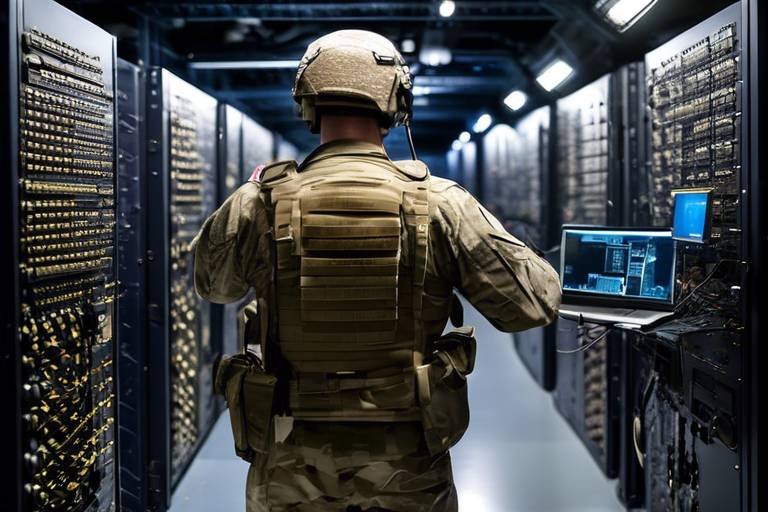How AI is Revolutionizing the Development of Weaponry
In today's rapidly evolving technological landscape, the integration of artificial intelligence (AI) into weaponry development is nothing short of revolutionary. Imagine a world where machines can make split-second decisions in the heat of battle, analyzing vast amounts of data faster than any human could. This isn't the distant future; it's happening right now. The transformation is not just about creating more advanced weapons; it's about redefining the very nature of warfare itself. As we delve deeper into this topic, we will explore how AI is reshaping military strategies, enhancing operational efficiency, and raising profound ethical questions that challenge our understanding of warfare.
To understand the current landscape, we must first take a step back and examine the historical context of AI in military applications. The journey began with simple algorithms designed to assist in logistical planning and data analysis. Over the decades, these rudimentary systems have evolved into sophisticated AI frameworks capable of enhancing decision-making processes and operational efficiencies across various military domains. From early attempts at automation to the advent of machine learning and deep learning, the military has consistently sought innovative ways to leverage technology for strategic advantage. Today, AI systems can analyze battlefield data in real-time, predict enemy movements, and even manage entire fleets of drones, making them invaluable assets in modern warfare.
One of the most significant advancements in military technology is the development of autonomous weapon systems powered by AI. These systems operate with minimal human intervention, making decisions based on algorithms that process information from numerous sensors. Imagine drones that can identify and engage targets without waiting for orders from a human operator. While this technology offers remarkable advantages in combat scenarios, it also sparks intense controversies regarding its ethical implications. The ability to conduct warfare without direct human oversight raises questions about accountability and the morality of allowing machines to make life-and-death decisions.
The potential benefits of AI-driven autonomous weapons are substantial. For instance, these systems can achieve increased precision in targeting, significantly reducing the likelihood of collateral damage. By utilizing advanced algorithms, autonomous weapons can analyze target data more accurately than a human, ensuring that strikes are carried out with surgical precision. Additionally, these technologies can operate in environments that are too dangerous for human soldiers, thereby reducing risk to personnel. In complex combat scenarios, where the fog of war can obscure visibility and understanding, autonomous systems can enhance operational capabilities and provide a strategic edge.
One of the most compelling arguments for the use of AI in military operations is its potential to minimize human error. In high-pressure situations, fatigue, stress, and emotional responses can lead to mistakes that have dire consequences. By relying on AI systems that are immune to these human factors, military operations can achieve greater accuracy and efficiency. For example, AI can analyze data from multiple sources to confirm target identities before engaging, potentially lowering the risk of unintended casualties and collateral damage.
Moreover, the speed at which AI can process information is a game-changer. In modern warfare, where time is of the essence, the ability to make rapid decisions can mean the difference between victory and defeat. AI algorithms can evaluate threats, assess battlefield conditions, and execute commands in fractions of a second. This enhanced speed allows military forces to respond to evolving threats more effectively, adapting strategies in real-time and maintaining the upper hand in combat scenarios.
Despite the significant advantages, the rise of AI in weaponry is fraught with ethical dilemmas. Who is responsible when an autonomous weapon makes a mistake? The operator, the programmer, or the military organization? These questions remain largely unanswered, creating a moral quagmire that challenges existing legal frameworks. Additionally, the prospect of autonomous killing raises profound ethical concerns. Can we truly justify machines making decisions about life and death? The potential for escalation in armed conflicts is another alarming consideration, as the ease of deploying AI-driven weapons could lead to more frequent and intense military engagements.
As we look beyond traditional battlefield scenarios, AI technologies are also reshaping cyber warfare strategies. The ability to conduct offensive and defensive operations in cyberspace is becoming increasingly crucial for national security. AI can analyze data patterns to identify vulnerabilities in systems, enabling military organizations to fortify their defenses against cyber threats. Conversely, AI can also be employed to launch sophisticated cyber-attacks, making it a double-edged sword in the realm of national defense.
One of the standout capabilities of AI in cybersecurity is its ability to enhance threat detection. AI algorithms can sift through massive amounts of data to identify anomalies that may indicate a cyber-attack. By automating the threat detection process, military organizations can respond to potential breaches more swiftly and effectively, neutralizing threats before they escalate. This proactive approach is essential in a landscape where cyber threats are becoming more sophisticated and pervasive.
The implications of AI in cyber warfare extend far beyond individual military organizations. As adversaries become increasingly sophisticated, the landscape of national security is shifting dramatically. Nations must adapt to the reality that cyber warfare is now a critical component of military strategy. The risks posed by AI-driven cyber capabilities necessitate a reevaluation of traditional security measures and protocols, pushing governments to invest in advanced technologies and strategies to protect their interests.
- What is AI-driven autonomous weaponry? AI-driven autonomous weaponry refers to military systems that can operate and make decisions with minimal human intervention, utilizing advanced algorithms to analyze data and execute commands.
- What are the ethical concerns surrounding AI in warfare? Ethical concerns include accountability for mistakes made by autonomous systems, the morality of machines making life-and-death decisions, and the potential for escalation in conflicts.
- How does AI enhance cyber warfare capabilities? AI enhances cyber warfare by improving threat detection, automating responses to breaches, and enabling offensive capabilities against adversaries.
- Can AI reduce human error in military operations? Yes, AI can significantly reduce human error by providing accurate data analysis and decision-making capabilities that are not influenced by human emotions or fatigue.

The Evolution of AI in Military Applications
Artificial Intelligence (AI) has come a long way since its inception, especially when it comes to military applications. Initially, AI was merely a set of basic algorithms designed to perform straightforward tasks. However, as technology advanced, these algorithms evolved into sophisticated systems capable of enhancing decision-making and operational efficiency in complex military environments. The evolution of AI in the military can be traced through several key phases, each marked by significant technological advancements and strategic shifts.
In the early stages, military applications of AI primarily focused on data analysis and logistics. For instance, AI systems were deployed to manage supply chains, optimize resource allocation, and predict maintenance needs for military equipment. These applications, while essential, barely scratched the surface of AI's potential. As computing power increased and machine learning techniques improved, the military began exploring more advanced applications, such as predictive analytics for threat assessment and battlefield simulations.
Fast forward to today, and AI is integral to various military operations. Modern AI systems can analyze vast amounts of data in real time, enabling military leaders to make informed decisions quickly. This capability is crucial in combat scenarios where the speed of information processing can mean the difference between victory and defeat. For example, AI algorithms can sift through intelligence reports, satellite imagery, and reconnaissance data to identify potential threats, allowing for a proactive approach to national security.
Moreover, AI's role in military applications has expanded to include the development of autonomous systems. These systems are designed to operate independently or with minimal human intervention, performing tasks ranging from surveillance to targeted strikes. The integration of AI into weaponry has revolutionized how military operations are conducted, leading to increased efficiency and effectiveness on the battlefield.
To put this evolution into perspective, consider the following table that highlights the key phases of AI development in military applications:
| Phase | Key Developments | Impact on Military Operations |
|---|---|---|
| Initial Algorithms | Basic data analysis and logistics | Improved supply chain management |
| Machine Learning | Predictive analytics and threat assessment | Enhanced situational awareness |
| Autonomous Systems | Development of drones and robotic systems | Increased operational efficiency and reduced human risk |
As we look to the future, the potential for AI in military applications is boundless. The ongoing research and development in AI technologies promise to further enhance the capabilities of armed forces worldwide. However, with great power comes great responsibility, and as AI continues to evolve, so too must our understanding of its implications for warfare and international security.
- What are the primary applications of AI in the military? AI is used for data analysis, logistics management, threat assessment, and the development of autonomous weapon systems.
- How does AI improve decision-making in military operations? AI processes vast amounts of data quickly, providing military leaders with timely information for informed decision-making.
- What are the ethical concerns associated with AI in warfare? Concerns include accountability for autonomous actions, the morality of machine-driven killing, and the potential for escalation in conflicts.

AI-Driven Autonomous Weapons
Artificial Intelligence (AI) is not just a buzzword; it’s a game-changer in the realm of military technology, particularly when it comes to autonomous weapons systems. These are weapons that can operate without direct human control, utilizing advanced algorithms and machine learning to make decisions in real-time. Imagine a drone that can identify a target, assess the situation, and execute an operation—all while you’re sipping coffee miles away. Sounds like science fiction? It’s closer to reality than you might think!
One of the most striking aspects of AI-driven autonomous weapons is their ability to process vast amounts of data at lightning speed. These systems can analyze environmental conditions, assess threats, and make split-second decisions that could be the difference between mission success and failure. This capability not only enhances combat effectiveness but also allows for a level of precision that human operators might struggle to achieve. For instance, an AI system can differentiate between a civilian and a combatant in a crowded area, potentially reducing collateral damage.
However, the rise of autonomous weapons does not come without its share of controversies. Critics argue that removing humans from the decision-making process raises serious ethical questions. Who is accountable if an autonomous weapon makes a mistake? Can we trust machines to make life-and-death decisions? These questions are at the forefront of discussions surrounding the deployment of AI in military operations.
Despite these concerns, the advantages of AI-driven autonomous systems are compelling. They offer several benefits that can significantly alter the landscape of modern warfare:
- Increased Precision: AI can enhance targeting accuracy, ensuring that strikes hit their intended targets with minimal collateral damage.
- Reduced Risk to Human Soldiers: By deploying autonomous systems in dangerous situations, we can protect human lives while still achieving military objectives.
- Operational Efficiency: AI can process information faster than any human, allowing for quicker responses to evolving threats.
As we delve deeper into the implications of AI in warfare, it’s essential to recognize that while these technologies can revolutionize military operations, they also demand rigorous oversight and ethical considerations. The potential for misuse or unintended consequences is significant, and as such, a robust framework for accountability and governance must be established.
In conclusion, AI-driven autonomous weapons represent a significant leap forward in military technology. They promise to enhance operational capabilities while minimizing risks to human soldiers. Yet, the ethical dilemmas they pose cannot be ignored. As we move forward, it’s crucial to balance the benefits of these advanced systems with the moral responsibilities that come with their use.
- What are AI-driven autonomous weapons? These are weapons systems that can operate independently without human intervention, using AI to make decisions in real-time.
- What are the benefits of using autonomous weapons? Benefits include increased precision, reduced risk to human soldiers, and enhanced operational efficiency.
- What are the ethical concerns surrounding autonomous weapons? Concerns include accountability for mistakes, the morality of autonomous killing, and the potential for escalation in conflicts.

Benefits of Autonomous Systems
In the ever-evolving landscape of modern warfare, autonomous weapon systems are emerging as game-changers. These systems, powered by artificial intelligence, bring forth a plethora of benefits that can significantly alter the dynamics of combat. Imagine a battlefield where precision, speed, and efficiency are not just goals but realities—this is the promise of AI-driven autonomy in military applications.
One of the standout advantages of autonomous systems is their ability to enhance precision in targeting. Traditional military operations often rely on human judgment, which can be swayed by emotions or fatigue. In contrast, AI algorithms can analyze vast amounts of data in real-time, identifying targets with unmatched accuracy. This capability not only increases the likelihood of hitting intended targets but also minimizes the risk of collateral damage, a crucial consideration in today’s warfare where civilian lives are often at stake.
Moreover, the deployment of autonomous weapon systems significantly reduces the risk to human soldiers. By utilizing drones and robotic systems to engage in combat, military forces can keep personnel out of harm's way. This shift is akin to sending in a highly trained robot rather than a soldier into a dangerous situation. The implications are profound: fewer casualties among military personnel, allowing them to focus on strategic planning rather than immediate survival.
The operational capabilities of autonomous systems are also noteworthy. These technologies can navigate complex environments, adapting to changing conditions on the ground with remarkable agility. For instance, in urban warfare scenarios where terrain can be unpredictable, autonomous systems equipped with AI can maneuver through obstacles and adapt their strategies in real-time. This adaptability is crucial in ensuring that military forces maintain the upper hand against adversaries.
Furthermore, the speed and efficiency that AI brings to the battlefield cannot be overstated. In military operations, the ability to make rapid decisions can be the difference between victory and defeat. Autonomous systems can process information and respond to threats at lightning speed, outpacing human reaction times. This capability allows military units to respond swiftly to evolving threats, effectively neutralizing potential dangers before they escalate.
In summary, the benefits of autonomous systems in military applications are multifaceted. From increased precision and reduced risk to enhanced operational capabilities and speed, these technologies are not just augmenting traditional warfare—they are revolutionizing it. As we look to the future, it is essential to recognize the potential of AI-driven autonomous weapons to reshape the battlefield landscape.
- What are autonomous weapon systems? Autonomous weapon systems are military technologies that can operate without human intervention, utilizing AI to make decisions in combat scenarios.
- How do autonomous systems improve targeting precision? They analyze data in real-time, allowing for more accurate identification and engagement of targets while minimizing collateral damage.
- What are the ethical concerns regarding autonomous weapons? Ethical dilemmas include accountability for actions taken by machines, the morality of autonomous killing, and the potential for escalation in conflicts.
- Can autonomous systems reduce the risk to soldiers? Yes, by engaging in combat scenarios where human soldiers would otherwise be at risk, these systems can help save lives.

Reduced Human Error
In the high-stakes world of military operations, the margin for error can mean the difference between victory and defeat, or even life and death. This is where the integration of artificial intelligence (AI) into weapon systems shows its true potential. By leveraging advanced algorithms and machine learning, AI can significantly reduce human error in combat scenarios, leading to more precise and effective military actions. Imagine a battlefield where decisions are made not just by instinct or emotion, but by data-driven insights that analyze countless variables in real-time. This is the promise of AI.
One of the most compelling aspects of AI is its ability to process vast amounts of information at speeds that far exceed human capabilities. For instance, in a typical combat situation, a human operator might struggle to assess multiple targets, evaluate the risk of collateral damage, and make a decision in a matter of seconds. In contrast, an AI system can analyze data from various sources—such as satellite imagery, reconnaissance drones, and historical engagement data—simultaneously, providing a comprehensive overview that informs tactical choices. This capability not only enhances the accuracy of strikes but also minimizes the potential for unintended consequences.
Moreover, AI systems are designed to learn from past experiences. Through machine learning, these systems continuously improve their decision-making processes by analyzing previous outcomes and adjusting their algorithms accordingly. This means that the more data they gather, the better they become at predicting the most effective course of action. For example, if an AI system identifies that a particular type of engagement led to a high rate of civilian casualties, it can adjust its targeting parameters to avoid similar mistakes in the future. This feedback loop is crucial in reducing human error and ensuring that military operations are conducted with the utmost precision.
However, it’s essential to recognize that while AI can reduce human error, it does not eliminate it entirely. The reliance on technology raises questions about accountability and oversight. Who is responsible if an AI system makes a catastrophic mistake? Addressing these concerns is vital as we move forward with AI in military applications. The challenge lies in finding a balance between harnessing the power of AI to improve operational effectiveness while ensuring that human judgment remains a critical component of military decision-making.
To further illustrate the impact of AI on reducing human error in military operations, consider the following table that outlines the differences between traditional human decision-making and AI-enhanced decision-making:
| Aspect | Human Decision-Making | AI-Enhanced Decision-Making |
|---|---|---|
| Speed | Slower response times due to information processing limits | Real-time analysis and rapid decision-making |
| Data Processing | Limited ability to analyze large datasets | Ability to process and learn from vast amounts of data |
| Emotional Influence | Decisions can be affected by stress and emotions | Decisions based purely on data and algorithms |
| Learning from Mistakes | Learning is slow and often inconsistent | Continuous improvement through machine learning |
In conclusion, the integration of AI into military operations offers a transformative approach to reducing human error. By enhancing decision-making processes and providing real-time data analysis, AI not only improves the accuracy of military strikes but also opens the door to more ethical and responsible warfare. As we continue to explore the implications of AI in weaponry, the goal should always be to augment human capabilities rather than replace them, ensuring that the ultimate responsibility for military actions remains with human operators.
- What is the primary benefit of using AI in military operations? The primary benefit is the reduction of human error, leading to more accurate and effective military actions.
- How does AI enhance decision-making in combat? AI enhances decision-making by analyzing vast amounts of data in real-time, allowing for quicker and more informed choices.
- Can AI completely replace human decision-makers in the military? No, AI is designed to augment human capabilities, not replace them. Human judgment remains crucial in military operations.
- What are the ethical concerns surrounding AI in warfare? Ethical concerns include accountability for mistakes made by AI systems and the morality of autonomous killing.

Speed and Efficiency
In the fast-paced world of modern warfare, are not just advantages; they are essential for survival. Imagine a battlefield where decisions must be made in the blink of an eye. Traditional military operations often involve lengthy decision-making processes, which can lead to missed opportunities and, ultimately, loss of life. Enter AI-driven systems, designed to enhance the speed at which military forces can respond to threats. These cutting-edge technologies analyze vast amounts of data in real-time, allowing commanders to make informed decisions faster than ever before.
One of the most significant benefits of AI in military operations is its ability to process information at lightning speed. For instance, while a human operator might take minutes to analyze a complex situation, an AI system can do it in seconds. This capability is particularly crucial in scenarios where every second counts, such as intercepting incoming missiles or responding to unexpected enemy movements. The integration of AI into military strategies can drastically reduce the time it takes to assess threats and deploy countermeasures, thereby increasing the likelihood of mission success.
Moreover, AI enhances operational efficiency by automating routine tasks, freeing up human personnel to focus on more strategic elements of warfare. For example, AI can handle logistics, supply chain management, and even maintenance schedules with remarkable precision. This automation not only streamlines operations but also ensures that resources are allocated effectively, minimizing waste and maximizing impact.
To illustrate the impact of AI on speed and efficiency, consider the following table that outlines the differences between traditional military operations and AI-enhanced operations:
| Aspect | Traditional Operations | AI-Enhanced Operations |
|---|---|---|
| Decision-Making Time | Minutes to Hours | Seconds |
| Information Processing | Human Analysis | Real-Time Data Analysis |
| Resource Management | Manual Oversight | Automated Systems |
| Operational Flexibility | Limited | Highly Adaptive |
As we can see, the advantages of AI in terms of speed and efficiency are profound. Military forces equipped with AI technologies can adapt to changing circumstances swiftly, outmaneuvering adversaries who may still rely on slower, traditional methods. This rapid responsiveness not only enhances tactical advantages but also contributes to overall mission success, potentially saving lives and resources in the process.
However, while the benefits of speed and efficiency are clear, it is essential to consider the implications of relying on AI in such critical situations. As we continue to integrate these technologies into military operations, we must remain vigilant about the challenges they present, including the need for robust oversight and ethical considerations in their deployment.
- How does AI improve decision-making in military operations? AI processes data much faster than humans, allowing for quicker and more informed decisions in high-pressure situations.
- What are the main benefits of using AI in warfare? Key benefits include increased speed of response, enhanced operational efficiency, reduced human error, and better resource management.
- Are there any risks associated with AI in military applications? Yes, risks include potential ethical dilemmas, accountability issues, and the possibility of escalating conflicts due to autonomous systems.
- How does AI affect logistics in military operations? AI can automate logistics and supply chain management, ensuring resources are allocated efficiently and operations run smoothly.

Ethical Concerns Surrounding AI Weapons
As we stand on the brink of a new era in warfare, the rise of artificial intelligence in weaponry stirs a pot of ethical dilemmas that are hard to ignore. Imagine a battlefield where decisions about life and death are made not by humans, but by algorithms and machines. This scenario raises profound questions about accountability, morality, and the very nature of conflict itself. As we delve into this complex issue, we must consider several critical factors that contribute to the ethical discourse surrounding AI weapons.
One of the most pressing concerns is the question of accountability. In traditional warfare, when a soldier makes a mistake, there are systems in place to hold them accountable. However, with autonomous weapons, who is responsible for a malfunction or a misjudgment? Is it the programmer, the military leader who deployed the weapon, or the machine itself? This ambiguity can lead to a dangerous precedent where responsibility is diluted, potentially allowing for war crimes to go unpunished.
Moreover, the morality of autonomous killing is a contentious issue. Can machines truly make ethical decisions? While AI can process information at lightning speed, it lacks the human capacity for empathy and moral reasoning. The idea of a machine deciding who lives and who dies is unsettling, to say the least. It forces us to confront uncomfortable questions: Should we allow machines to make life-and-death decisions? What happens when these machines are programmed with biased data, leading to skewed outcomes that could disproportionately affect certain groups of people?
Another significant concern is the potential for escalation in armed conflicts. With AI weapons capable of rapid decision-making and execution, the threshold for engaging in warfare may lower. Nations might be more inclined to use force, knowing that they can deploy autonomous systems without risking human lives. This could lead to a new arms race, where countries strive to outdo each other in developing increasingly sophisticated and lethal AI technologies.
To further illustrate these concerns, consider the following table that summarizes key ethical issues associated with AI weapons:
| Ethical Concern | Description |
|---|---|
| Accountability | Who is responsible for the actions of autonomous weapons? |
| Morality of Killing | Can machines make ethical decisions regarding life and death? |
| Escalation of Conflict | Could AI lead to more frequent and less restrained warfare? |
In conclusion, the integration of AI into weaponry presents a myriad of ethical challenges that we must address as a society. As we continue to innovate and develop these technologies, it is crucial to engage in open dialogues about their implications. We must strive to ensure that our advancements do not come at the cost of our humanity. The future of warfare may depend on it.
- What are autonomous weapons?
Autonomous weapons are systems that can operate without human intervention, making decisions about targeting and engagement based on pre-programmed algorithms. - Why is accountability a concern with AI weapons?
Accountability is a concern because it is unclear who is responsible for the actions of AI systems, leading to potential legal and ethical ambiguities. - Can AI make ethical decisions?
Currently, AI lacks the ability to make ethical decisions like humans do, as it does not possess empathy or moral reasoning. - How could AI weapons escalate conflicts?
AI weapons could lower the threshold for engaging in warfare, making it easier for nations to resort to military action without the risk to human soldiers.

AI in Cyber Warfare
In the modern battlefield, the concept of warfare has dramatically transformed, extending far beyond the physical realm to the vast, intricate world of cyberspace. Artificial Intelligence (AI) is at the forefront of this evolution, reshaping how military organizations approach cyber warfare. Imagine a digital battlefield where algorithms engage in combat, identifying and neutralizing threats faster than any human could. This is not science fiction; it’s the reality of AI in cyber warfare.
AI technologies are enabling military forces to develop sophisticated strategies that enhance both offensive and defensive capabilities. By leveraging machine learning and data analysis, these systems can predict potential cyber threats, analyze vast amounts of data in real-time, and respond to attacks with unprecedented speed. For instance, AI can sift through millions of network packets, identifying anomalies that could signify a cyber attack. This ability to detect threats early is crucial in an era where cyber attacks are becoming more frequent and sophisticated.
Moreover, AI's role in cyber warfare is not limited to threat detection. It also plays a significant role in offensive operations. Military cyber units can deploy AI-driven tools to execute attacks against enemy systems, disrupting their operations and gaining a strategic advantage. The question arises: how do we balance the benefits of such powerful tools with the potential risks they pose? The rapid advancement of AI in this domain raises serious ethical and operational concerns. As we delve deeper, it becomes essential to consider not just the capabilities of AI, but also the implications of its use in warfare.
One of the most significant contributions of AI in cyber warfare is its ability to enhance threat detection. Traditional cybersecurity measures often rely on predefined signatures to identify threats, which can be ineffective against new or evolving attacks. AI, however, employs advanced algorithms that learn from patterns and behaviors, allowing it to detect anomalies that might indicate a cyber threat. This proactive approach is akin to having a digital watchdog that continuously learns and adapts to new challenges. For example, AI systems can analyze user behavior on a network and flag any unusual activity that deviates from the norm, potentially catching breaches before they escalate.
The implications of AI in cyber warfare are profound, particularly concerning national security. As adversaries become more sophisticated, the need for advanced cybersecurity measures has never been more critical. Nations must not only invest in AI technologies for their defense but also consider the potential for AI to be weaponized by malicious actors. The landscape of cyber warfare is evolving, and with it, the strategies employed by both state and non-state actors. This creates a complex environment where traditional security measures may no longer suffice.
Furthermore, the global nature of cyberspace means that a cyber attack can originate from anywhere, making it challenging to attribute attacks to specific actors. This uncertainty complicates diplomatic relations and can lead to escalations in conflict. As nations enhance their cyber capabilities, the potential for a cyber arms race looms large. Countries must navigate this landscape carefully, balancing the pursuit of technological superiority with the need for international stability.
- What is AI's role in cyber warfare? AI enhances both offensive and defensive cyber capabilities, allowing for improved threat detection and response times.
- How does AI improve threat detection? AI algorithms analyze patterns and behaviors, enabling them to identify anomalies that may indicate a cyber attack.
- What are the ethical concerns surrounding AI in warfare? Ethical dilemmas include accountability for autonomous actions and the potential for escalation of conflicts.
- Can AI be weaponized by malicious actors? Yes, as AI technologies become more accessible, there is a risk of them being used for cyber attacks by various actors.
- What are the implications for national security? The integration of AI in cyber warfare raises challenges in attribution, defense strategies, and the potential for a cyber arms race.

AI for Threat Detection
In the rapidly evolving landscape of cyber warfare, artificial intelligence is proving to be a game-changer, particularly in the realm of threat detection. Imagine a world where military organizations can identify and neutralize cyber threats before they even have a chance to inflict damage. This is not just a futuristic dream; it's becoming a reality thanks to AI. By leveraging sophisticated algorithms and machine learning techniques, AI systems can sift through vast amounts of data at lightning speed, identifying patterns and anomalies that might signal a potential cyber attack.
One of the primary advantages of AI in threat detection is its ability to operate in real-time. Traditional cybersecurity methods often rely on human analysts who can be overwhelmed by the sheer volume of data. In contrast, AI can continuously monitor networks, analyzing traffic and user behavior without the fatigue or bias that human operators might experience. This leads to quicker identification of suspicious activities and significantly reduces the window of vulnerability for military networks. For instance, an AI system can detect a sudden spike in data traffic that deviates from the norm, flagging it for further investigation.
Moreover, AI enhances the accuracy of threat detection. Instead of relying solely on predefined signatures of known threats, AI systems can learn from new data and adapt over time. This means they can identify previously unknown threats, often referred to as zero-day vulnerabilities, which are particularly dangerous because they exploit unknown weaknesses in software. By employing techniques such as anomaly detection and predictive analytics, AI can forecast potential attacks based on historical data, providing military organizations with a proactive defense strategy.
However, the integration of AI into threat detection is not without its challenges. As AI systems become more advanced, so too do the tactics employed by adversaries. Cyber attackers are increasingly utilizing AI to craft more sophisticated attacks, making it essential for military organizations to stay one step ahead. This arms race between AI-driven defense mechanisms and AI-enhanced cyber threats creates a dynamic and continuously shifting battlefield.
To illustrate the impact of AI on threat detection, consider the following table that compares traditional methods with AI-driven approaches:
| Criteria | Traditional Methods | AI-Driven Approaches |
|---|---|---|
| Speed of Detection | Slower, often reliant on human analysis | Real-time, automated monitoring |
| Adaptability | Limited, based on known threats | High, learns from new data |
| Volume of Data Processed | Can be overwhelmed by large datasets | Capable of processing vast amounts of data |
| Accuracy | Higher false positive rates | Reduced false positives through learning |
In conclusion, AI is revolutionizing the way military organizations approach threat detection in cybersecurity. The ability to quickly identify and respond to potential threats not only strengthens national security but also enhances the overall effectiveness of military operations. As technology continues to advance, the importance of AI in maintaining a robust defense against cyber warfare cannot be overstated.
- What is AI in threat detection? AI in threat detection refers to the use of artificial intelligence technologies to identify and respond to potential cyber threats in real-time.
- How does AI improve the speed of threat detection? AI systems can continuously monitor data and analyze patterns at speeds far beyond human capabilities, allowing for immediate identification of suspicious activities.
- What are zero-day vulnerabilities? Zero-day vulnerabilities are previously unknown security flaws that cyber attackers exploit before developers have a chance to address them.
- Can AI completely replace human analysts? While AI significantly enhances threat detection capabilities, human analysts remain essential for interpreting complex situations and making strategic decisions.

Implications for National Security
The rise of artificial intelligence (AI) in military applications is not just a technological advancement; it represents a profound shift in the landscape of national security. As nations increasingly integrate AI into their defense strategies, the implications are vast and multifaceted. One of the most pressing concerns is the potential for an arms race. Countries may feel compelled to accelerate their AI weapon development programs to maintain a competitive edge, leading to a scenario where the race for dominance could escalate tensions globally.
Moreover, the integration of AI into military operations introduces new vulnerabilities. For instance, AI systems can be susceptible to cyber attacks, where adversaries might exploit weaknesses in algorithms or data integrity. This could lead to catastrophic failures in military operations, potentially compromising national security. Imagine a scenario where an enemy successfully hacks into an autonomous drone fleet, redirecting them to attack friendly forces instead. The consequences of such an event would be dire, not only for the immediate military response but also for the broader implications on international relations.
Furthermore, the use of AI in warfare raises significant ethical dilemmas. Decisions about life and death are increasingly being made by algorithms, which can lead to questions about accountability. If an AI system mistakenly identifies a target and causes civilian casualties, who is held responsible? Is it the programmer, the military leader, or the machine itself? This ambiguity could strain diplomatic relations and lead to international disputes, as nations grapple with the moral implications of AI-driven warfare.
Another critical aspect to consider is the impact on global power dynamics. Countries that successfully harness AI for military applications may gain a significant advantage over those that lag behind. This could lead to shifts in alliances and power structures, as nations seek to partner with technologically advanced states to bolster their own defenses. The potential for AI to create new forms of warfare, such as cyber warfare, also means that traditional military strategies may become obsolete, necessitating a reevaluation of national security policies.
In light of these challenges, it is imperative for governments to engage in comprehensive discussions about the regulation of AI in military contexts. Establishing international norms and agreements could help mitigate the risks associated with AI weaponry. These discussions should focus on creating frameworks that ensure accountability, promote transparency, and foster cooperation among nations to prevent an uncontrolled arms race.
To summarize, the implications of AI for national security are profound and complex. As we stand on the brink of this new era in warfare, it is crucial for policymakers, military leaders, and technologists to work together to navigate the challenges and seize the opportunities that AI presents. By doing so, we can strive for a future where technology enhances security without compromising ethical standards or global stability.
- What are the main risks associated with AI in national security? The main risks include the potential for an arms race, vulnerabilities to cyber attacks, ethical dilemmas regarding accountability, and shifts in global power dynamics.
- How can nations mitigate the risks of AI in warfare? Nations can mitigate risks by establishing international norms and agreements, promoting transparency, and fostering cooperation to prevent an uncontrolled arms race.
- What role does accountability play in AI-driven military operations? Accountability is crucial as it determines who is responsible for decisions made by AI systems, especially in cases of civilian casualties or operational failures.
Frequently Asked Questions
-
What is the role of AI in the development of weaponry?
AI plays a crucial role in modern weaponry development by enhancing decision-making processes, improving operational efficiency, and enabling the creation of autonomous systems. These advancements allow for more precise targeting and faster responses to threats, fundamentally changing how military operations are conducted.
-
How do autonomous weapons powered by AI operate?
Autonomous weapons utilize advanced algorithms and machine learning to analyze data from various sources, make decisions, and execute actions without human intervention. They can assess situations in real-time, allowing them to engage targets with high precision while minimizing risks to human soldiers.
-
What are the benefits of using AI-driven autonomous weapons?
Some key benefits include:
- Increased precision in targeting, reducing collateral damage.
- Lower risk to human soldiers by taking them out of direct combat situations.
- Enhanced operational capabilities in complex environments, allowing for more effective responses to evolving threats.
-
What ethical concerns arise from the use of AI in weaponry?
Ethical concerns include accountability for actions taken by autonomous systems, the morality of allowing machines to make life-or-death decisions, and the potential for escalation in conflicts due to the speed and efficiency of AI-driven systems. These issues raise important questions about the future of warfare and international security.
-
How is AI changing the landscape of cyber warfare?
AI is reshaping cyber warfare by enabling military organizations to develop more sophisticated offensive and defensive strategies. AI algorithms improve threat detection, allowing for quicker responses to cyber threats and enhancing overall national security in an increasingly digital battlefield.
-
What implications does AI in cyber warfare have for national security?
The implications for national security are significant, as AI can empower adversaries with advanced capabilities, making traditional security measures less effective. This requires nations to adapt their strategies and invest in AI technologies to stay ahead of potential threats.



















